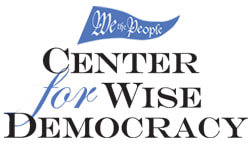- The risk in this process is hard to find. Essentially this is just a random selection of citizens who give a speech and go away. But there is the feeling of risk because it evokes transformational change.
- Sometimes people worry that there is danger of profound disappointment in the general public if the process doesn't work as advertised, or if special interests contaminate the process. But even if these unlikely events happen, the process is still a giant leap forward. Mainstream citizens still become more knowledgeable about the deep systemic aspects of issues and the new public conversation still comes into being. And the next Wisdom Council continues the conversation. There is little risk of going backward.
- Another worry is that people will get discouraged if the CIC suggests a piece of legislation but it doesn't happen. People say, "Won't this feel disempowering to ordinary citizens?" … No. The objective of the Wisdom Council is to begin the new conversation, one that involves elected officials, special interests, experts and citizens, where "statements of the people" continually evolve forward. This is different than the usual aims where the goal is to influence elected officials. Here, we are building a shared awareness that the people have ultimate authority, and providing a way to exercise that authority.
- There is the FEELING of risk because at a deep level, people recognize that this process changes everything, including our system of thinking, talking and making collective choices. It represents a new form of democracy, "Wise Democracy." So even though there is no identifiable collective risk … there is personal risk.
- ->Examples
